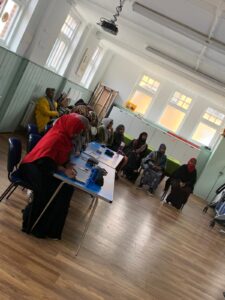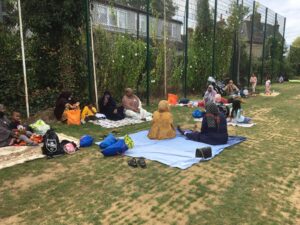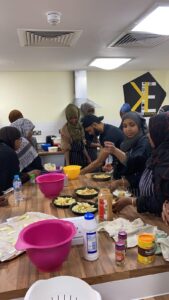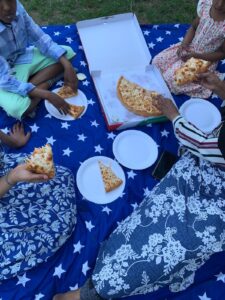One Year On: KLS’ Somali Women’s Wellbeing Group
To support local refugee women to explore and talk about their mental health and wellbeing we set up a Somali Women’s Wellbeing Group. Over the last year we’ve run weekly sessions for 24 Somali women (Jan-Nov’20). We also invited more women (about 35 in total), who are on our waiting lists and through word of mouth to invite ‘friends of friends’, to attend our summer picnics and access one-to-one support.
Inevitably the Covid-19 pandemic and lockdown restrictions impacted on our ability to run our face-to-face sessions. So we moved our support online and over the telephone during these challenging times. Often arranging calls after their kids had gone to bed at night.
To read the full report you can do so here:
KLS Somali Women’s Group – Final Report Dec20
For the highlights continue reading…
Mental Health is taboo
“I’m a young mum with three children. I met Faaduma through my children’s school. I feel very supported especially with mental health as it is such a taboo in our community and helped us normalise mental health in the group. She helped us to establish a community where we can share our feelings. Thanks for changing our lives!!”
There is substantial evidence to suggest that BAME populations in the UK experience higher rates of mental illness (DH, 2002) dealing with issues of migration, dislocation, displacement and trauma (Bhugra et al, 2010). This is further compounded with living in poverty, which is associated with worse mental health outcomes, particularly among women (UK CEDAW, 2013; PHE, 2017). For example, women are more likely than men to handle family budgets and manage debt, have caring responsibilities (stress, anxiety and depression associated with raising children and caring for elderly parents) and are often the ‘shock absorbers’ of reduced family incomes, meaning that they ‘go without’ to protect their children from the worst effects of poverty.
The Somali community in Battersea is the third largest BAME community locally, and identified as ‘hard to reach’. Somali women face multiple issues of poverty, trauma, discrimination, language barriers, a high incidence of special educational needs and domestic violence. Mental health is seen as taboo and they often do not discuss their low mood or depression with family or friends. Many of their children attend our Love to Learn education programme of homework, GCSE and youth clubs.
Many Somali people see mental health difficulties as a taboo subject. With our group they found a safe space to develop their understanding about mental health, and what they can do to improve their mental health and that of their family members too. Although the project was set up with the aim of improving mental health, the link between physical and mental health has been important to the group and they have had sessions on empowerment, visiting the GP, art, Zumba, parenting and healthy cooking and eating.
The difference we’ve made
KLS’ Somali Women’s Group has significantly improved the outcomes for the women involved.
- Improved the mental health of 24 local Somali Women. All of the women reported having low level mental health issues and low self-esteem when the group started (see below). By the end they reported having made significant improvements in their feelings about themselves, and acquiring the skills and coping mechanisms to better support themselves and deal with issues in the future.
- Increased the confidence for the women to seek support from other services for their mental health. The women reported accessing their GPs, Talk Wandsworth (a local talking therapy support service), and local community organisations and charities for help and support such as the Foodbank and Citizens Advice.
- Empowered the group to lead themselves after the project ended. The group does need a bit more support to become a peer-led and sustainable group, but they are getting there.
Results
“At first I was nervous and hesitated before coming to the sessions, but all in all it was lovely. I had the best time. I had the opportunity to meet some lovely mothers who had shared the same culture and background as me and shared same amazing life experiences. I loved the cooking sessions in particular.”
We can say with confidence that KLS’ Somali Women’s Group has had a significant improvement on the lives of the women that were supported in 2020. All the women answered a questionnaire to test for seven areas of wellbeing. We used the academically-recognised and validated Warwick-Edinburgh Mental Wellbeing Scale, at the beginning and end of the group.
In January most of the women were not feeling optimistic about the future at all. This was before Covid-19 had any effect on their lives. But by the end more than half (53%) were feeling optimistic often or all of the time. This can be attributed to the new skills they acquired, new experiences they had, new friendships and support networks they developed during the course of the group.
By the end of the year most of the women reported that they were able to deal with their problems better (76%), able to think more clearly (94%), and make better decisions in the life (94%).
Three-quarters (75%) of the women were not feeling useful at all at the start of the Group. By the end this had reversed to three-quarters of them feeling useful often or all of the time.
Many of them relaxed over the course of the year (even with the lockdown restrictions increasing the difficulties in their daily lives), with more than 71% of the women feeling relaxed often or all of the time by the end.
Finally, and maybe most importantly, their relationships improved massively during the course of the year, inside and outside the group. 88% were feeling closer to other people by the end of November. The strength and number of relationships (and support networks) is a key indicator of current and future wellbeing and health. We were pleased that the group has had such an impact on the women involved.
Feedback
Here are some things that the women have said:
“KLS has helped me with everything including my mental health.”
“You’ve changed my life for the better!”
“The simple activities have helped me a lot.”
“This is the first time I’ve come out since the lockdown. It’s so nice to be out with the children and see the other ladies.”
Member story: Muna is much less stressed

Muna, a local parent, describes her time with us, “I wanted to get out of the house so I went to the Somali Women’s Group. I had post-natal depression after my baby was born but I never talked about it, even though I went to hospital. In my culture we are told that to go to the Koran if you’re not feeling well. My family just said, ‘it’s just a baby, its normal, a Muslim woman shouldn’t be stressed’. I came to the Group because I didn’t want to be at home being stressed and I want to help other women too. For example, in the last session it got emotional and I was crying and I think other women were able to cry because of that, and crying is good.
Now I feel able to talk about issues and ask for help. Somali women are supposed to be strong, but I don’t have family here or the support we have at home, so I need to ask for help. I used to get very angry with my children but now I can manage better because of the advice we got in the group. My marriage was also very difficult but I got good advice and we are still together.”
Plans for the future
We plan to offer lite-touch support to the existing Women’s Group for the next 3 months (Q1 – 2021) as they increasingly find their feet. We are seeking funding for a new cohort of women to join a new Support Group in 2021.
The final word goes to Saida, who joined our Somali Women’s Group this year. “Honestly, I loved the group and I could not believe we were having it in our area. Every session I attended, I learnt some useful skills that improve the quality of life. My confidence is improving every day. I use my time wisely. I started to manage my anger and stress better. I reorganized my household and throw away many things that I did need to have in my house. I also become a great parent as I implemented many of the useful tips.”
Download the full report
Here: KLS Somali Women’s Group – Final Report Dec20
